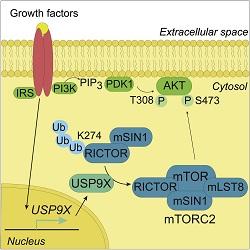
mTORC2 is a protein complex in a network which transduces extracellular signals from growth factors into cellular responses such as growth, proliferation and nutrient metabolism. The precise mechanisms of this process are unclear. However, Dr Lidia Wrobel and colleagues from CIMR’s Rubinsztein lab demonstrate in Cell Reports that growth factors stimulate the expression of the protease USP9X, which then has a role in activating mTORC2 and downstream signalling. The protein RICTOR is needed to form the mTORC2 complex, but it can’t do so when ‘tagged’ with polyubiquitin at K274. USP9X removes the ubiquitin ‘tags’ from RICTOR, enabling the deubiquitinated RICTOR to form an active mTORC2 complex with other components. Dysregulated mTORC2 is a feature of some metabolic disorders and cancers; new mechanistic insights such as this may contribute towards understanding of these diseases and potentially guide new therapeutic approaches.

